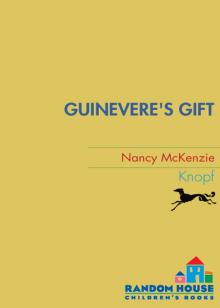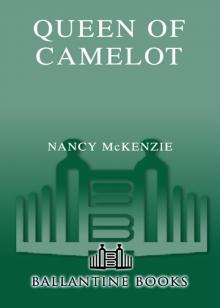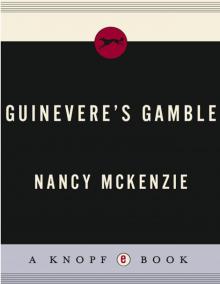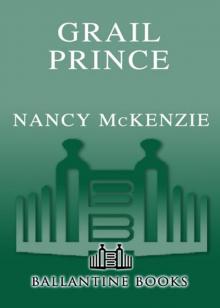- Home
- Nancy McKenzie
Grail Prince Page 2
Grail Prince Read online
Page 2
If we get there. Again the unbidden voice of fear whispered in his ear. Two boys traveling through Welsh hills left lawless by the decimation of Camlann—they could so easily be killed by a couple of bandits with decent knives, or by a starved wolf, or even by a night out in the cold without a fire. . . .
Impatiently Galahad shrugged off the weight of his fear and went out to the rock ledge beyond the cave. He lifted the wolf carcass by its heels until it was drained of blood. Then he dragged it back inside the cave, slit it open, and began to skin it.
“Sharpen a stick or two. Let’s roast the pluck.”
In the end they roasted all the flesh they could get off the bones, and stuffed it into their saddlebags for future meals. They ate the liver and the heart, and finding there was not enough dirt on the cave floor to bury the bones and entrails, threw them off the rock ledge, a feast for night’s creatures. They stretched the wolfskin to dry by the fire and then sat down, looking at each other. Neither of them made a move toward his bedroll. Instead, Percival brought out the skin of wine the Lady had given him at parting, and offered it to Galahad.
“We’re still in Guent now, aren’t we?” he asked. “A day out of Caerleon? How many days until we reach Gwynedd?”
“I was going to ask you that. I’ve never been to Wales. You live here.”
Percival looked uncomfortable. “Yes, but until I sneaked away to join Arthur’s army I had never been out of my own valley. I don’t even know where the border lies. I won’t know where we are until we get to land I recognize.”
Galahad tried a smile. “Then we’ll have to hope the commander at Caerleon was telling us the truth. Northwest, he said. Gwynedd lies northwest of everything.”
“You didn’t like the Caerleon commander, did you? What was his name, Sir Bruenor? I thought he was courteous enough.”
“He’s a Cornishman. Sir Caradoc and the men from Caerleon I knew all died at Autun. Bruenor is Constantine’s man. Caerleon is Constantine’s. Camelot is Constantine’s. So is Britain, if there is a Britain still.”
“You didn’t like him because he was Cornish? Cornishmen are Britons, too.”
“Under Arthur they were tame enough. But the dukes of Cornwall have always been ambitious. Constantine has wanted the High Kingship all his life. Now he has it. But I wonder how many will follow him.”
“We have to begin again somewhere. It might as well be with Constantine.”
Galahad smiled at his young cousin. “Will you follow Constantine, then, King of Gwynedd?”
Percival colored. “I am king only because my father was killed at Autun. My uncle Peredur is appointed regent until I’m fifteen. Those were Arthur’s orders.”
“Arthur is dead. There is no one to enforce those orders now. You can be king from the day of your arrival home, or your uncle can snatch it from
“I’m glad to hear it.”
“I know he wouldn’t!”
“We’ll find out as soon as we get to Gwynedd.”
“My mother wouldn’t let him. Or my sister.”
Galahad shook his head. “Peredur has a sword. They don’t.”
“He wouldn’t harm them!” Percival cried. “He wouldn’t dare!”
Galahad moved closer to him and slung an arm around his shoulders. “Calm down, and keep your voice low. I didn’t mean that. I only meant to point out your position. Who’s been ruling in Gwynedd since your father left for Brittany with Arthur? Your mother or Peredur?”
“My father appointed Peredur regent in his stead.”
“You see? For six months he’s been in command of every soldier there. He’s got their loyalty by now; he’s appointed his own captains. If he’s any sort of leader he’s in full control of the house guard, too. He already has the power in his hands. It’s a small step from regent to outright king. There’s only you in the middle.”
Percival gulped. “What are you saying? That I’ll have to fight him for my birthright?”
Galahad shrugged. “You wouldn’t be the first. He’s Maelgon’s brother. He has a claim to it. You’re the only one in his way.” He paused. “What kind of man is he? Direct or devious? Selfish? Cruel?”
“N-no. Not cruel. Direct, yes. We breed men so in Gwynedd.”
“Well.” Galahad handed him back the wineskin. “You’re a long way from fighting him for your birthright. You can hardly move that arm of yours, much less hold a sword. And even if you could, you know little enough of swordplay. You had better let me be your sword. I’ll stay with you in Gwynedd, at least until we see which way the land lies.”
“Will you?” Percival’s eyes were shining. “Thank you, cousin. Your sword is protection against any man in Britain! But there won’t be any need. Wait and see. Uncle Peredur will welcome you with open arms. After all, you’re his nephew, too. My whole life he’s always bragged to others how his sister Elaine married Lancelot of Lanascol, the High King’s second-in-command. He’s prouder of his kinship bonds with Lancelot, which are only through marriage, than he is of his blood cousin, the High Queen Guinevere. He’d never raise a sword against Lancelot’s son.”
“That was in the old days,” Galahad said levelly. “Now everything has changed. Lancelot’s name will not be as bright as it was.”
“Why not?”
“He’s gone home to Lanascol. For good. He’s given up on Britain. On the future. He said his time is past. He’d never back Constantine. And I wouldn’t be surprised if he’s not alone.”
Percival sat silent, staring moodily at the flames.
“Britain lies on the brink of disaster,” Galahad muttered. “Everything Arthur fought for, the peace and unity of the past twenty years, is already undone. As soon as the Saxons realize what has happened, the Kingdom of the Britons could go up in smoke.”
Percival looked up and met his eyes. “But it won’t. We’ll unite. We’ll rebuild.”
Galahad managed a smile. “Who’s we? A fourteen-year-old Breton nobody likes and an eleven-year-old boy from the northwest corner of Wales? Who would follow us? I’m not so certain Britain can be put back together. Too many men are dead. Too few left living who dreamed Arthur’s dream.”
A wolf howled mournfully in the distance, and the hairs rose on the backs of both their necks. Percival threw a log on the fire and shuddered.
“Go ahead and sleep,” Galahad said gently. “I’ll stand watch. You need your rest. We’ll get an early start in the morning.”
Galahad gazed into the deep heart of the fire as Percival’s breathing slowed toward sleep. This creeping journey, this covert slinking through the Welsh hills toward the protection of Percival’s home, might prove to be the end of his and Percival’s fortunes—for they were powerless against any man with a force at his back—or it might be a beginning. It all depended upon what they found when they reached Gwynedd.
2
GWYNEDD
In the steep mountains of North Wales the first snows were falling. Bare hardwoods raked leaden skies with naked fingers while dark pines spread green skirts to catch the swirling flakes, and the earth settled grudgingly to sleep under her cold blanket. Streams froze slowly at their edges. Hard ground crunched underfoot. Every breath was captured, timeless, by the still, unmoving air.
At the top of a narrow ridge Galahad led his horse carefully along the slippery track, past rocky outcrops and ledges that overhung sheer drops to the valley far below. Percival, sitting on the horse’s back, stared glumly down through the veil of snow at the misty outlines of his father’s castle.
“Home at last,” he muttered. “Now that we’re upon it, I’d rather be anywhere else.”
Galahad looked down at the silent valley. The castle was well placed, nestled between the high hills with a wide view of the sea. The sea itself lay shrouded in fog, but he knew it was there, cold, gray, and forbidding. He could smell it. “Putting it off won’t make it any easier. Besides, we’re out of food. We’ve been a week too long as it is, thanks to the weather.”
Percival glanced down at his bandaged shoulder and the stiff sling cradling his arm. “Do you think I’ll ever use this arm again? It doesn’t feel like it will ever heal.”
“Don’t you remember how it felt the day I found you at Avalon? Why, you were half out of your mind with pain. And look at you now—able to ride.”
Percival snorted. “I don’t call this riding, sitting upon your horse while you lead us both. I can’t get a decent grip on the reins, and I’m on the verge of falling off every other step. Why can’t you use a saddle, like other men?”
“Oh, well,” Galahad said lightly, “if you’d rather walk . . .”
“Oh, no! Thank God for your horse, my dear cousin. Good old Farouk! I’d never have made it walking, and horses are scarcer than hen’s teeth since Camlann.” He shuddered. “I still have nightmares. It seems like only yesterday—I thought for certain I had lost my arm.”
“In six months you’ll be wielding your sword again with the best men in the kingdom.”
Percival grimaced. “To tell truth, I have lost my taste for battle. And you were right, I think, to have doubts about the future. Between Autun and Camlann, what kings are left in Britain?”
“The King of Gwynedd, for one.”
“Exactly. Boys and babies who cannot rule their own lands. Who will protect us, with Arthur gone?” He scowled. “And when we ride up to the gates of Gwynedd, what shall I say to them all? Here I am, but no one comes with me—I have lost our army. Every last man of it is dead!”
“They died in Arthur’s service, defending Britain. There is no higher honor for a soldier.”
“But I live!” Percival cried. “What kind of king am I, to return alone without my men? They probably have lookouts posted along the shore, expecting my father to come sailing in, triumphant, with all his men gathered on the deck. Whatever will they say when they see it is only me?”
“You’re working yourself up. Your fever will return. Surely your family will forgive you your recovery. They will all be glad to see you safely home, even without Maelgon, even without the army. I will tell them of your courage at Autun, and how you drew your father’s troops together after he fell, and how you led them against the Saxons at Cerdic’s Field, and how Arthur trusted you. You will be a hero to them all, Percival, young as you are.”
“Oh, of a certainty,” came the bitter reply. “A boy who left home without permission, defied his father, and sneaked across the sea, who lived to see the death of every man who served his homeland—the death of his father and his king—yes, indeed, how welcome I will be!” He coughed violently, and wiped his sleeve across his eyes.
Gradually, as they descended the steep hills, Percival’s chatter turned from memories of war to healing dreams he had dreamed at Avalon. His favorite was of a lovely maiden who had appeared to him three times and whose kisses had eased his pain.
“The most beautiful girl on earth, cousin! Skin as white as snow, hair as black as a raven’s wing, and lips as red as new blood. When she kissed me my pain vanished and I felt like an emperor!”
“Healing dreams, indeed! This is strange talk for a beardless boy.”
Percival’s face was flushed and his eyes gleamed overbright through the curtain of falling snow. Remembering Percival’s fevers in the House of Healing at Avalon, Galahad hurried the horse down the steep and slippery path. Behind him Percival continued his banter and, because it was preferable to hearing him worry about his reception at home, Galahad let him talk. It was not until they reached the lower slopes that Galahad realized Percival’s jabber no longer made sense. He turned. The boy’s face was dark and hot, his eyes half-closed and unseeing. His whole body shivered as it burned. Galahad leaped onto the stallion’s back, hugged Percival tightly against him, and grabbed the reins.
“Come on, Rouk; you’ll have to carry us both the rest of the way.”
It took another hour to reach the valley floor, and twenty minutes at a swift canter to reach the castle gates. By then Percival had gone cold and silent, a deadweight against Galahad’s body.
The guards at the gate sounded the alarm. Men came running as Galahad slid from the steaming horse with Percival senseless in his arms. The guards among them drew their swords. Before Galahad could speak to defend himself, a chestnut mare pounded up at a hard gallop, and the rider, a slender youth royally appointed, sprang from the mare’s back in the middle of a sliding stop, gravel and dirt flying everywhere. Even as he opened his mouth to protest on Percival’s behalf, Galahad admired the skill the stunt required. The youth raced to Percival’s side and stared down into his ashen face.
“It’s Percival! Call the queen—it’s Percival!” Cold green eyes narrowed at Galahad. “You villain! What have you done to my brother? How dare you treat him so! He is a king!” The boy spun on his heel and pointed. “You, and you, and you, send for the queen and the physicians! And you, sir, you will answer for his pitiable state! Give me your name and family!”
Galahad stared into the young, furious face and found he could not speak. The youth was a prince, for certain, dressed in a fur cap, soft boots, and a good, thick riding cloak. Wide, gray-green eyes shot at him a hatred as intense as any he had seen on a battlefield.
“I asked your name. Men, arrest this rogue and throw him in the dungeon! If my brother dies, he dies. If he recovers, this blackguard will speak to me or I’ll have his tongue out!”
No one stepped forward to restrain him, and Galahad pushed past the youth toward the castle and warmth. Clearly, the boy was a mere child, not a prince of standing, not to be taken seriously. He stopped when he felt a dagger point touch his back.
“Don’t trifle with me, princeling. Or I will have your life. I can do it.”
“Sir,” Galahad croaked, wondering desperately what had happened to his throat, “I do not doubt it. Kill me if you must, but first let me get Percival to a fire.”
“Oh!” The youth gasped, withdrawing the dagger. “A fire! Bryll, take him to the meeting chamber; there’s a log fire going, and—and light the brazier in Val’s room. Tell the queen Val is home—” He whirled toward the motionless guards. “Cowards, all of you! Afraid this intruder might be somebody, with his fine clothes and his bearing? What about my brother? Percival is your king!”
Galahad strode away after the servant. So they knew already of Maelgon’s death. Was that the reason no one disciplined this unruly child? Would he find the widowed queen prostrate with grief? But prince or no prince, the lad deserved a whipping.
In a large room with a snapping log fire, Galahad laid Percival on the hearth and knelt beside him. An old hound, displaced from his rest, licked Percival’s face, with a gently wagging tail. Percival lay absolutely still, his flesh as livid as a serpent’s belly. Galahad bent his ear to the boy’s chest and to his relief heard the sounds of life. He turned quickly as footsteps sounded behind him, but it was the young firebrand again, finished scolding the guards.
“Is that the best you can do? No blankets? No bedding? Did you find him thus in the forest? Or did you do this to him yourself?”
Galahad bristled. “I am Percival’s friend!”
“A friend! May the blessed saints preserve me from such a friend! He’s perfectly blue! Where are the blankets? The hot bricks? The broth? He’s chilled to the bone—and senseless! Hadn’t you even a bedroll to wrap him in? Bryll! Goran! Lucan! Broth! Bricks! Blankets!”
The boy knelt down and put a slender hand to Percival’s face. “Oh, Val, Val. You’re so cold! And you’ve been away so long! I’ve given you up for dead a thousand times and it was all my fault.”
Galahad stared at him. “Your fault? How is it your fault?”
“Never mind. When it’s your business to know, I’ll tell you.”
“Take care you don’t knock his shoulder,” he said in exasperation. “He’s been wounded.”
“Wounded! Sick and wounded? When did that happen? King Arthur would never have let him fight; he’s far too young. Wounded! What in God’s nam
e were you doing in the mountains in winter with a wounded boy, sick with fever? Trying to kill him?”
“Dandrane!” A sharp voice rang out between them. “You should get lashes for swearing and rudeness to a stranger.” Galahad looked up to see Queen Anet—it had to be Percival’s mother; she looked exactly like him— come through the door with a crowd behind her. Small in stature, dark in coloring, she was not a pretty woman, but her face reflected her well-known kindness and gentleness of soul.
“Percival!” She fell to her knees and clasped her son’s cold hand to her breast. “Does he live?”
A physician, bending over Percival’s face, muttered pessimistically, but Galahad found his voice at last.
“Yes, madam, do not fear. He is weak from traveling—we have been too long upon the road—but he has had the best care in Britain. And he’s as strong as anything.”
Her dark eyes flew to his face. “You are his friend,” she said suddenly, almost smiling. “And you brought him home. God bless you.”
“Serious, most serious,” the physician muttered.
“Some friend,” Dandrane whispered behind the queen. “With such a friend, he needs no enemies!”
“Still, I may be able to save him.” The physician laid his ear against Percival’s chest.
“Hush, Dandrane.” The queen spoke patiently, her eyes on Percival’s face. “You know nothing of where they have been or what has happened to them. No doubt they have both been through hard times. Winter’s come early; they might easily have been stranded in the mountains or attacked by wolves. Behave yourself, child, and take off your cap in the house. Do try to remember who you are.”
It was not much of a rebuke, to Galahad’s mind. He thought the lad deserved at least a beating. But the pale face flushed with color and the gray-green eyes stared hard at the flooring as the prince reached up and obediently snatched the cap from his head. Down tumbled a wild tangle of chestnut curls. Galahad’s jaw dropped.
“I’m sorry, Mother.” The voice from behind the curtain of beautiful hair was small and contrite. “But I’m scared for Val.” The pale face lifted and Galahad blinked twice. He found himself staring at a pretty girl.

 Guinevere's Gift
Guinevere's Gift Queen of Camelot
Queen of Camelot Guinevere's Gamble
Guinevere's Gamble Grail Prince
Grail Prince Prince of Dreams
Prince of Dreams